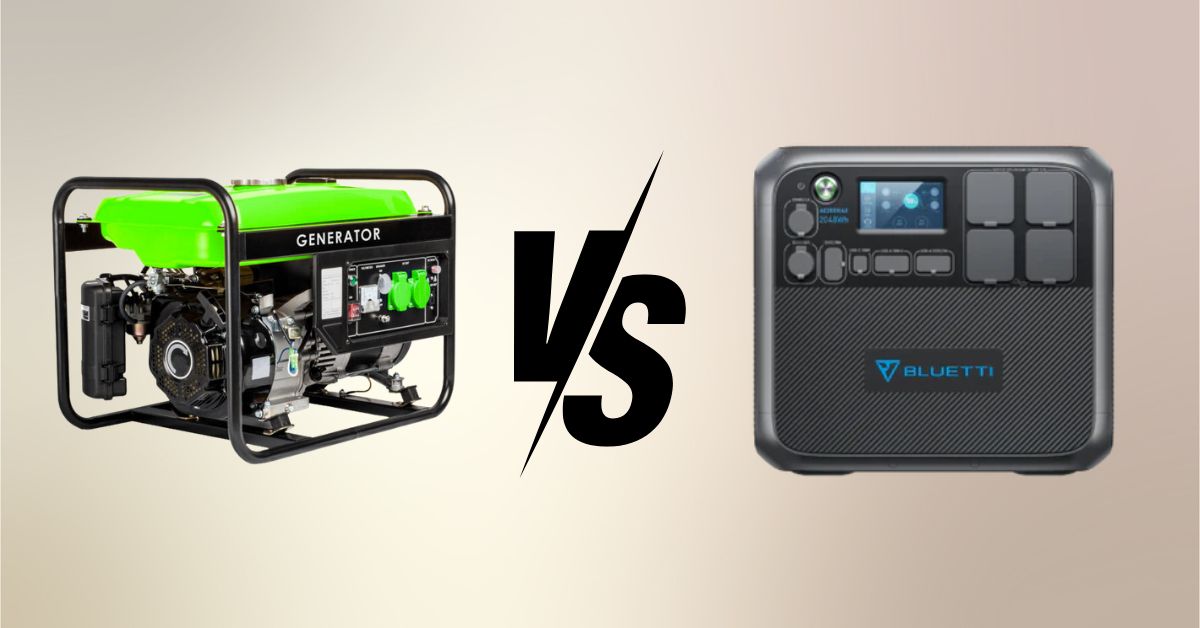
What is the Difference Between a Portable Generator and a Power Station?
What is the difference between a generator and a Portable Power Station? One is fuel-guzzling and noisy, the other is silent and solar-ready. Whether you’re prepping for a blackout or heading off-grid, understanding the strengths and limitations of each can help you choose wisely. Let’s explore everything from small electronics to high-wattage appliances—and find out what your power source can handle.
Not sure which power station is right for you?
Take the quiz!
Understanding Portable Power Station Capabilities
Wattage and Watt-Hour Ratings
What Do the Numbers Mean?
Wattage tells you the immediate power a device needs. Watt-hours (Wh) tell you how long your portable power station can deliver that energy. For example, a 500Wh solar generator can power a 50W fan for 10 hours. Simple math helps you avoid surprises.
Use Runtime Formula for Accuracy
Runtime (hours) = Power Station Capacity (Wh) ÷ Device Wattage (W). Knowing this helps you understand what portable power stations can run and for how long.
Output Options: AC, DC, and USB
AC Outlets: Household Electronics
Using a portable power station with plug socket allows you to run TVs, laptops, or a coffee maker. Look for a model with a 3 pin plug for Australian compatibility.
DC Outputs and USB Ports
Mini coolers, car accessories, and small devices like phones and tablets charge easily via DC and USB. What can you charge with a portable power station? Most of your daily-use electronics, no problem.

What Portable Power Stations Can Run
Everyday and Mid-Range Devices
Phones, Tablets, and Laptops
These are low-wattage and portable power station-friendly. You’ll get long runtimes and reliable charging.
Lights and Fans
Perfect for campers and preppers. LED lights use minimal power. Desk fans and even CPAP machines are also supported—just mind your wattage.
Entertainment Gear
What can portable power stations run? Small TVs, speakers, and even gaming consoles for short periods. It’s ideal for relaxed camping or power outages.
Kitchen and Workshop Gear
Microwaves, kettles, and power tools require more energy. Use high-capacity solar generators or a traditional power generator for short, strategic runs.

Portable Power Station Safety Tips and Final Thoughts
Monitor Temperature and Load
To prevent overheating, keep your station in a shaded, well-ventilated space. Don’t exceed the recommended wattage when connecting high-demand devices—especially while charging.
Choosing the Right Unit
Before purchase, confirm whether your station supports pass-through charging. Not all models do, and some may only offer it on specific output ports.
Is a Portable Power Station a Power Bank?
Not quite. A power bank typically refers to a smaller, USB-only battery pack for phones. A portable power station is much larger and supports AC, DC, and USB outputs—capable of running appliances, tools, and more.
Still unsure what model is right for you?
Call us at 1300 241 125 or email gday@truegear.com.au for expert guidance.


